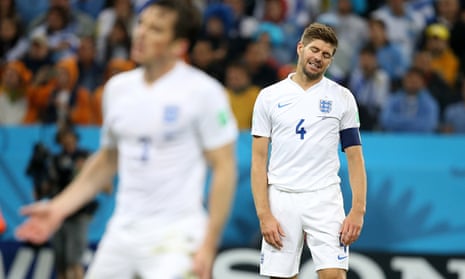England were sent tumbling out of the World Cup at the group stage for the first time since 1958 after Costa Rica beat Italy 1-0 in their Group D match in Recife on Friday.
Roy Hodgson’s side needed Italy to take maximum points from the match to have any hope of survival. The result means Tuesday’s match against Costa Rica, who have now qualified for the knock-out stages, is meaningless for England.
Hodgson said he had no intention of resigning after the 2-1 defeat to Uruguay on Thursday in which Luis Suárez scored both goals on his first appearance since undergoing knee surgery a month ago. And he was backed by FA chairman Greg Dyke who said the 66-year-old would be remaining in his post until after the 2016 European Championships.
“We’re supportive of Roy Hodgson, we’ve asked him to stay as manager,” Dyke said. “We do not see any value in changing. We think Roy has done a good job and it is an approach over four years and we hope to do better in the European Championships.”
It is the first time in 56 years England have fallen at this stage of the finals, with that World Cup squad the only one younger than the current crop. The other group-stage exit came in 1950 – the previous time the tournament was held in Brazil – and, while they approached the tournament more in hope than expectation, their early exit rankles.
The general consensus heading into the tournament was that it could not be any worse than the under-achievement in South Africa four years ago. However, defeats to Italy and Uruguay coupled with surprise package Costa Rica means it has been just that, with the inquest that follows unlikely to make pretty reading for the Football Association or Hodgson.
As well as Dyke, Hodgson retains the full support of FA board members Sir Trevor Brooking, Alex Horne and Adrian Bevington, who installed him as Fabio Capello’s successor two years ago. They have seen enough promise in Brazil to believe that Hodgson is the right man to take England through to Euro 2016, which is being held in France.
“Everybody thought we played really well in the first game and narrowly lost,” Dyke said when asked why England had lost both their opening World Cup games for the first time in history. “In the second game it could have gone either way. We were not humiliated or anything like that. They were narrow defeats, but it is for the football people, not for me to identify why we did not win.”
Ever since he took on the job of FA chairman, Dyke has targeted victory at the 2022 World Cup. When he was asked whether that target was still attainable, Dyke said: “Yes, I do, but I think it means lots of changes in English football. I think there is a real chance that we can develop and win in 2022 – that is the aim.”

Comments (…)
Sign in or create your Guardian account to join the discussion